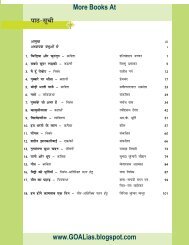t.com www.GOALias.blogspot.com www.GOALias.blogspot.com
t.com www.GOALias.blogspot.com www.GOALias.blogspot.com
t.com www.GOALias.blogspot.com www.GOALias.blogspot.com
- No tags were found...
Create successful ePaper yourself
Turn your PDF publications into a flip-book with our unique Google optimized e-Paper software.
<strong>www</strong>.<strong>GOALias</strong>.<strong>blogspot</strong>.<strong>com</strong>134 Politics in India since Independencemany splits, which led to its decline. Organisations like the Backwardand Minority Communities’ Employees Federation (BAMCEF) tookover this space.Bharatiya Kisan UnionThe social discontent in Indian society since the seventies wasmanifold. Even those sections that partially benefited in the processof development had many <strong>com</strong>plaints against the state and politicalparties. Agrarian struggles of the eighties is one such example wherebetter off farmers protested against the policies of the state.Credit: Hindustan TimesGrowthA Bhartiya Kisan Union Rally in Punjab.In January 1988, around twenty thousand farmers had gathered inthe city of Meerut, Uttar Pradesh. They were protesting against thegovernment decision to increase electricity rates. The farmers campedfor about three weeks outside the district collector’s office until theirdemands were fulfilled. It was a very disciplined agitation of the farmersand all those days they received regular food supply from the nearbyvillages. The Meerut agitation was seen as a great show of rural powerof the Bharatiya Kisan Union (BKU), an organisation of farmers fromwestern Uttar Pradesh and Haryana regions. The BKU was one of theleading organisations in the farmers’ movement of the eighties.We have noted in Chapter Three that farmers of Haryana, Punjaband western Uttar Pradesh had benefited in the late 1960s from thestate policies of ‘green revolution’. Sugar and wheat became the maincash crops in the region since then. The cash crop market faced a crisisin mid-eighties due to the beginning of the process of liberalisation ofIndian economy. The BKU demanded higher government floor pricesfor sugarcane and wheat, abolition ofrestrictions on the inter-state movementof farm produce, guaranteed supply ofelectricity at reasonable rates, waivingof repayments due on loans to farmersand the provision of a governmentpension for farmers.Similar demands were made by otherfarmers’ organisations in the country.Shetkari Sanghatana of Maharashtradeclared the farmers’ movement asa war of Bharat (symbolising rural,agrarian sector) against forces of India(urban industrial sector). You havealready studied in Chapter Threethat the debate between industry and
















